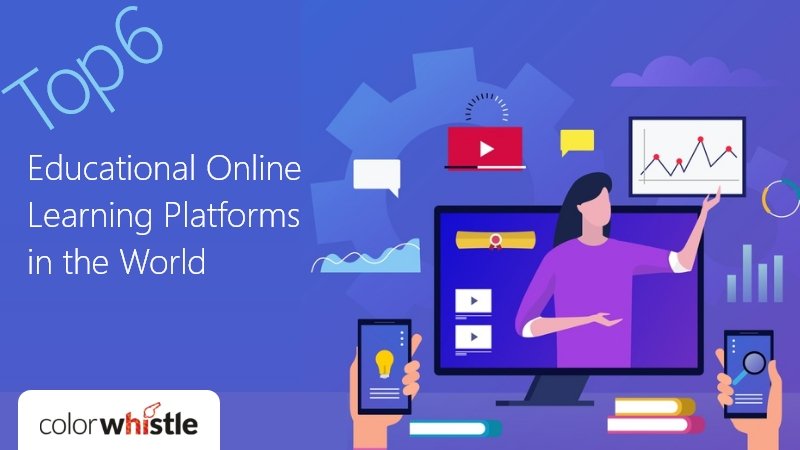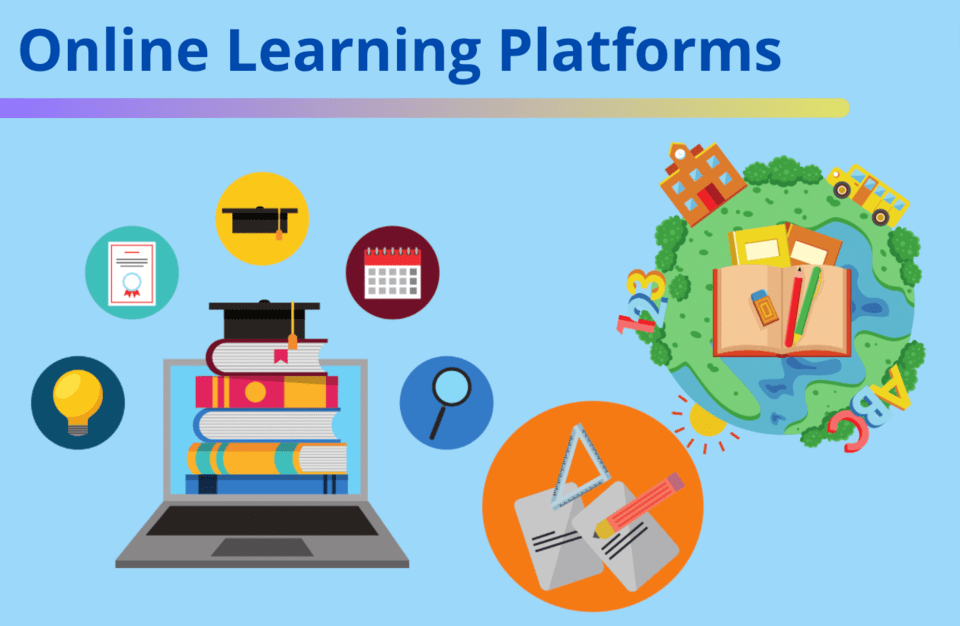Online learning platforms for professionals offer flexible, accessible, and high-quality courses. They cater to various industries and skill levels.
Online learning platforms have revolutionized professional development. Professionals can now access a wide range of courses, from technical skills to soft skills, at their convenience. Platforms like Coursera, Udemy, LinkedIn Learning, and edX provide courses designed by industry experts and top universities.
These platforms often include interactive elements, such as quizzes and peer discussions, to enhance the learning experience. Moreover, many offer certifications that can boost career prospects. The flexibility to learn at your own pace makes these platforms ideal for busy professionals. With options available for different budgets, online learning platforms are an invaluable resource for continuous professional growth and skill enhancement.

Credit: colorwhistle.com
The Rise Of Online Learning For Professionals
Online learning platforms have transformed professional development. They offer flexible and accessible education for busy professionals. This shift has created a boom in digital learning.
Why It’s Booming
Several factors contribute to the rapid growth of online learning. Here’s why:
- Flexibility: Professionals can learn at their own pace and schedule.
- Accessibility: Courses are available from anywhere with internet access.
- Cost-Effective: Online courses often cost less than traditional education.
- Variety: A wide range of subjects and skills are covered.
- Certification: Many platforms offer certificates to boost resumes.
The Shift From Traditional To Digital
The shift from traditional to digital learning is evident. Professionals prefer online platforms for various reasons:
- Convenience: No need to commute or adhere to a strict schedule.
- Interactive Content: Engaging videos, quizzes, and forums enhance learning.
- Global Reach: Learn from experts worldwide without geographical constraints.
- Continuous Learning: Stay updated with the latest industry trends and skills.
Below is a table comparing traditional and online learning:
| Aspect | Traditional Learning | Online Learning |
|---|---|---|
| Location | Classroom-based | Anywhere with internet |
| Schedule | Fixed | Flexible |
| Cost | Higher | Lower |
| Interaction | Face-to-face | Virtual |
Professionals are embracing online learning. This trend is reshaping how we approach career development.

Credit: elearningindustry.com
Evaluating Your Needs
Choosing the right online learning platform can be challenging. Professionals must evaluate their specific needs to find the best fit. Understanding what you require from an online course can maximize the benefits you receive. This section will guide you through identifying skill gaps and setting learning goals.
Identifying Skill Gaps
The first step in evaluating your needs is identifying skill gaps. A skill gap analysis helps you understand what you lack and need to improve. Here are some methods to identify these gaps:
- Self-Assessment: Reflect on your current skills and compare them with industry standards.
- Peer Feedback: Ask colleagues for honest feedback on your performance.
- Performance Reviews: Use past performance reviews to identify areas needing improvement.
Knowing your weaknesses enables you to choose courses that address these gaps. This makes your learning journey more efficient and targeted.
Setting Learning Goals
Once you have identified your skill gaps, setting clear learning goals is crucial. Goals provide direction and motivation. Here’s how you can set effective learning goals:
- Be Specific: Define what you want to learn in precise terms.
- Measure Progress: Set milestones to track your progress.
- Achievable Targets: Ensure your goals are realistic and attainable.
- Relevant Skills: Focus on skills that are relevant to your career growth.
- Time-bound Objectives: Set deadlines to complete your learning goals.
By setting clear goals, you make your learning process structured and purposeful. This increases your chances of success and professional growth.
| Method | Description |
|---|---|
| Self-Assessment | Reflect on your skills and compare with standards. |
| Peer Feedback | Get honest feedback from colleagues. |
| Performance Reviews | Use past reviews to identify improvement areas. |
Top Platforms To Consider
Online learning platforms have revolutionized professional development. They offer flexible and accessible education. There are many platforms to choose from. Each caters to different needs and learning styles. Below are some top platforms professionals should consider.
Coursera And Edx: The Academics
Coursera and edX are renowned for their academic rigor. They partner with top universities and institutions worldwide. Professionals can access high-quality courses from institutions like Stanford, MIT, and Harvard.
- Coursera: Offers a wide range of courses, specializations, and degree programs.
- edX: Known for its MicroMasters programs and professional certificates.
Both platforms offer verified certificates. These can enhance your resume and LinkedIn profile.
Udemy And Skillshare: Skill Enhancement
Udemy and Skillshare focus on practical skills. They provide a vast array of courses in various fields.
| Platform | Focus | Key Features |
|---|---|---|
| Udemy | Professional skills |
|
| Skillshare | Creative and practical skills |
|
These platforms are ideal for quick skill upgrades. They offer courses on-demand and are often more affordable.
Linkedin Learning And Masterclass: Industry Insights
LinkedIn Learning and MasterClass provide unique insights from industry leaders. They focus on professional growth and personal development.
- LinkedIn Learning: Offers courses taught by industry experts. Topics include business, technology, and creative skills.
- MasterClass: Features classes taught by celebrities and experts. Topics range from writing and cooking to leadership and negotiation.
Both platforms are subscription-based. They provide continuous learning opportunities and keep professionals updated with industry trends.

Credit: www.create-learn.us
Specialized Platforms For Tech Professionals
Tech professionals need continuous learning to stay ahead in their field. Several platforms offer specialized courses tailored to specific tech skills. Two of the most popular are Codecademy and Udacity.
Codecademy: Coding Skills
Codecademy is perfect for those wanting to learn coding. The platform offers interactive lessons in various programming languages. These include Python, JavaScript, and Ruby.
The courses are structured to help you build real-world projects. This hands-on approach ensures you can apply what you learn immediately. Codecademy’s platform is user-friendly, making it suitable for beginners and experts alike.
| Feature | Details |
|---|---|
| Languages Offered | Python, JavaScript, Ruby, and more |
| Course Type | Interactive lessons and projects |
| User Level | Beginner to Expert |
Udacity: Tech & Innovation
Udacity specializes in cutting-edge tech and innovation courses. The platform partners with industry leaders like Google and IBM. This ensures the content is current and relevant.
Udacity offers Nanodegree programs in areas like Artificial Intelligence and Data Science. These programs are more intensive and designed for serious learners. Each course involves real-world projects and mentorship from industry experts.
Here are some key benefits of Udacity:
- Real-world projects
- Mentorship from industry experts
- Up-to-date content
For tech professionals, both Codecademy and Udacity provide valuable resources. Choose the one that best fits your learning goals.
Navigating Through The Options
Choosing the right online learning platform can be overwhelming. Professionals have many options to consider. Understanding the differences between platforms will help in making an informed decision.
Free Vs. Paid Courses
Online learning platforms offer both free and paid courses. Free courses are great for exploring new topics. Paid courses often provide more in-depth content and resources.
| Feature | Free Courses | Paid Courses |
|---|---|---|
| Content Depth | Basic | Advanced |
| Resources | Limited | Extensive |
| Support | Minimal | Comprehensive |
Certificates And Credibility
Certificates can boost your professional profile. They add credibility to your skills. Not all certificates are created equal. Here are some points to consider:
- Accreditation: Ensure the certificate is from a recognized institution.
- Industry Recognition: Some certificates are more valued in certain industries.
- Practical Application: Courses that offer hands-on projects are more beneficial.
Choosing the right certificate can make a difference in your career growth.
Platform Options
Many platforms cater to different needs. Here are some popular options:
- Coursera: Known for academic partnerships.
- Udemy: Offers a wide range of courses.
- LinkedIn Learning: Great for career-focused skills.
- Skillshare: Focuses on creative skills.
Each platform has its unique strengths. Choose based on your professional goals.
Learning Communities And Networking
Online learning platforms for professionals offer more than just courses. They provide a rich environment for learning communities and networking. These platforms are designed to foster connections and encourage collaboration. By engaging with peers, professionals can enhance their learning experience and grow their networks.
Joining Virtual Study Groups
Joining virtual study groups is a great way to enhance your learning experience. These groups allow professionals to collaborate and share knowledge. Here are some benefits of joining virtual study groups:
- Collaborative Learning: Exchange ideas and insights with peers.
- Accountability: Stay motivated by setting goals with group members.
- Support System: Get help and support from fellow learners.
Many online learning platforms provide tools to create and join virtual study groups. For instance, Coursera and LinkedIn Learning have features that allow you to connect with other learners. Use these features to form or join a study group that aligns with your professional goals.
Leveraging Community Forums
Community forums are a valuable resource on online learning platforms. They offer a space for professionals to discuss topics, ask questions, and share experiences. Here’s how you can leverage community forums effectively:
- Participate Actively: Engage in discussions and answer questions.
- Ask Questions: Don’t hesitate to ask for help or clarification.
- Share Resources: Provide useful links, articles, or tools to the community.
Platforms like Udemy and Skillshare have active community forums. These forums are moderated to ensure a positive and productive environment. Participation in these forums can enhance your learning and help you build a professional network.
| Platform | Study Groups | Community Forums |
|---|---|---|
| Coursera | Yes | Yes |
| LinkedIn Learning | Yes | No |
| Udemy | No | Yes |
| Skillshare | No | Yes |
By utilizing these features, professionals can maximize their learning and build meaningful connections. Learning communities and networking are essential components of professional growth and development.
Maximizing The Online Learning Experience
Online learning platforms offer professionals a flexible and convenient way to gain new skills and knowledge. To get the most out of these platforms, it’s crucial to approach your studies strategically. This section will guide you through creating a study schedule and applying your newfound knowledge in real-world scenarios.
Creating A Study Schedule
A well-structured study schedule can significantly enhance your learning experience. Here are some tips to create an effective study plan:
- Set clear goals: Define what you aim to achieve by the end of each course.
- Break down tasks: Divide the course material into manageable chunks.
- Allocate specific times: Dedicate particular hours of the day for study.
- Include breaks: Short breaks can help maintain focus and productivity.
- Track progress: Regularly review what you have learned and adjust your schedule accordingly.
Applying Knowledge In Real-world Scenarios
Applying what you learn in real-world scenarios helps reinforce knowledge and build practical skills. Consider these strategies:
- Work on projects: Implement your learning by working on relevant projects.
- Collaborate with peers: Engage with other professionals to discuss and solve real-world problems.
- Seek feedback: Get feedback from mentors or colleagues to improve your skills.
- Reflect on experiences: Regularly reflect on how you apply new knowledge in your professional life.
- Stay updated: Keep abreast of industry trends to continuously refine your skills.
| Tip | Description |
|---|---|
| Set clear goals | Define what you aim to achieve by the end of each course. |
| Break down tasks | Divide the course material into manageable chunks. |
| Work on projects | Implement your learning by working on relevant projects. |
| Seek feedback | Get feedback from mentors or colleagues to improve your skills. |
Future Trends In Professional Learning
Online learning platforms have revolutionized the way professionals upskill. As the landscape evolves, several trends are emerging. These trends are set to shape the future of professional learning.
Ai And Machine Learning In Education
Artificial Intelligence (AI) and Machine Learning (ML) are transforming education. These technologies personalize learning experiences. They analyze individual performance and adapt content accordingly.
AI-driven platforms offer the following features:
- Customized learning paths
- Real-time feedback
- Predictive analytics for skill gaps
Machine Learning algorithms enhance these platforms by:
- Identifying learner strengths and weaknesses
- Recommending targeted resources
- Facilitating adaptive assessments
The Increasing Importance Of Soft Skills
Technical skills are crucial, but soft skills are gaining importance. Employers seek professionals with strong communication, leadership, and emotional intelligence.
Soft skills include:
| Soft Skill | Description |
|---|---|
| Communication | Effective sharing of ideas and information |
| Leadership | Guiding and inspiring teams |
| Emotional Intelligence | Understanding and managing emotions |
Online platforms now offer courses focused on these skills. Interactive modules and real-world scenarios enhance learning. Professionals can practice and refine these skills in a safe environment.
Frequently Asked Questions
Which Online Course Is Best For Working Professionals?
Udemy, Coursera, and LinkedIn Learning are top choices for working professionals seeking online courses.
What Is The Best Online Learning Platform?
Coursera is a top online learning platform offering diverse courses from leading universities and companies.
What Is A Professional Learning Platform?
A professional learning platform offers courses and resources for skill development, career advancement, and continuous education in various fields.
What Is The Best Online Learning Provider?
Coursera is widely regarded as the best online learning provider. It offers diverse courses from top universities and institutions.
Conclusion
Navigating through online learning platforms can enhance your professional skills effectively. Choose the one that fits your goals best. With so many options available, continuous learning has never been more accessible. Start exploring these platforms today to take your career to the next level.
Happy learning!

